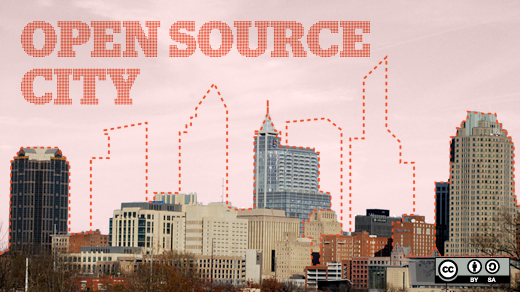Open government scored another victory when the City of Raleigh announced the Open Raleigh initiative—an online repository with open data, web and mobile applications, and links to participatory tools and organizations. It’s all part of Raleigh’s open source strategy focusing on transparency, collaboration, and improved access to information. It’s proof of the ongoing work of the public-facing, open source resolution Raleigh unanimously passed earlier this year.
As part of the Open Raleigh announcement, the city included an online feedback system: My Raleigh Ideas! It’s a new service the city will use to collaborate with the public to solicit ideas on future projects and topics. Currently, the city is using it to prioritize the data citizens might want in the open data portal and to solicit input for the open data policy.
You can’t get much more open source than collaboratively creating your open data policy with citizens and other stakeholders. City staff “engage with citizen groups, youth development programs, entrepreneurs, and businesses to create an open data policy,” according to the Open Raleigh home page.
The city’s open source strategy is an ongoing partnership with citizens. We have seen, through the actions of elected officials, city staff, and citizen groups like the Citizens Advisory Council (CAC), that gathering citizen input is part of Raleigh’s open source culture.
Raleigh’s open data portal
The open data portal brings different software solutions together to solve multiple problems. It’s a great strategy.
City governments shouldn’t work to write code or solve problems that are already solved—it’s redundant. Why reinvent the wheel when you can subscribe to a constant stream of updates or deploy a solution that has already solved the technological challenge at-hand?
Government IT departments are deploying solutions that already fix these problems. In this specific example, Raleigh is successfully piecing together different technologies to create a comprehensive open data portal. Let’s take a look at the technical components of Open Raleigh.
ESRI powers the open data portal
The grand vision for the open data portal has two components, ESRI and a to-be determined solution similar to Socrata. They both play a critical role housing the available data and making it easier-to-consume by end users.
The ESRI geoportal server is an open source product that enables discovery, use, and publishing of metadata for geospatial resources. It allows custom downloads of data using a map-based interface. ESRI is also used at the county and state level, which allows for seamless searching. Citizens, developers, and businesses can already use almost 100 geospatial layers available through the geoportal.
The city is also looking to deploy a solution similar to Socrata to house other data resources for the open data portal. This type of solution would use an open data platform to transform information assets such as geospatial data and unstructured content into consumable data.
Granicus powers citizen engagement
The MyRaleigh Ideas! crowdsouring platform uses the Granicus CivicIdeas product. The city is using the open data project as a test case for the tool. They are currently using MyRaleigh Ideas! to solicit feedback and determine which open data sets are a priority for the community. Pending the outcome of the pilot, the platform may be available for other city departments to use for their citizen engagement needs.
GovDelivery makes email easy
GovDelivery helps government agencies create effective digital communications. Raleigh has deployed an effective email subscription solution called My Raleigh Subscriptions that allows citizens to opt-in to email updates of their choosing. From my own personal experience, it’s saved me a ton of duplicate emails. Citizens can choose from a variety of topics ranging from alerts to newsletters, meeting agendas to news releases, event information to crime alerts, and much more.
SeeClickFix is the Open311 solution
SeeClickFix is a way for citizens to report non-emergency problems to the city such as potholes, graffiti, or broken sidewalks. Behind the scenes, SeeClickFix uses the Open311 standard which is an effort to coordinate a standardized, open-access, read/write model for citizens to report non-emergency issues.
Citizens no longer need to hunt down a phone number or get bounced around from department to department. Once they see a problem, the can click to report it through a website or a mobile application, and the city will acknowledge the issue and channel it to the right department to get it fixed.
The impact
Open Raleigh is making a big difference for the citizen experience. We’ve talked about just a few of the open tools that are changing how citizens can affect their surroundings. However, the successful use of open technology in North Carolina is no longer a simple one-way street. In part two of this series, we’ll explore the impact Open Raleigh is having on open source.
Read part one of this series: An open source city takes shape: The impact of Open Raleigh.






1 Comment